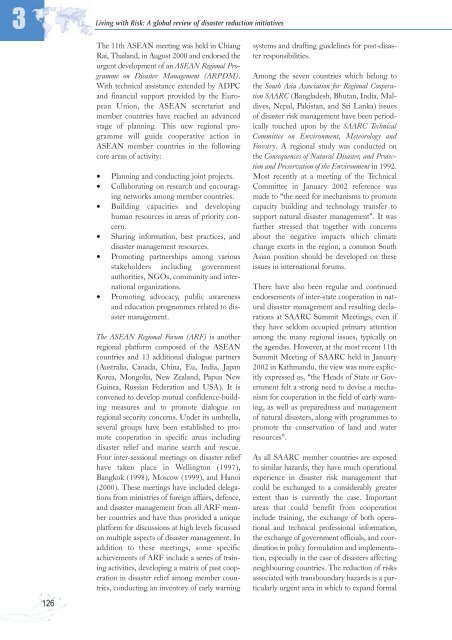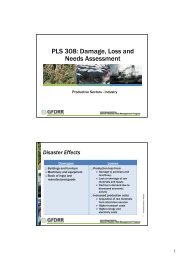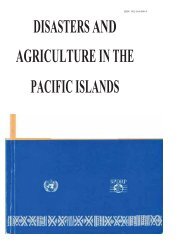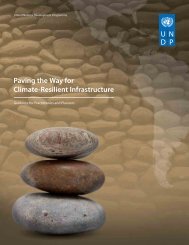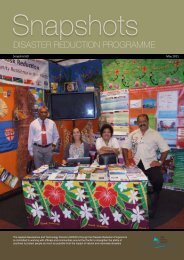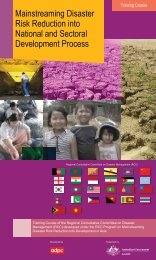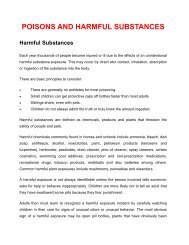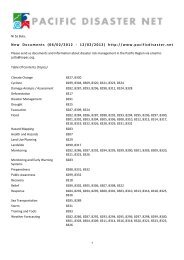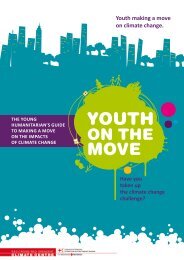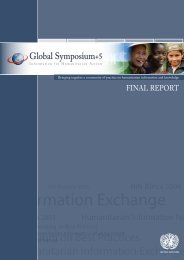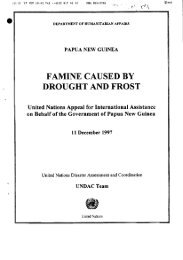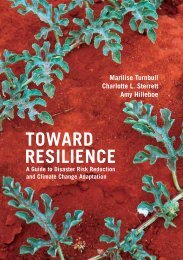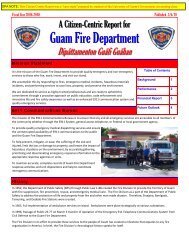A global review of disaster reduction initiatives - Welcome to the ...
A global review of disaster reduction initiatives - Welcome to the ...
A global review of disaster reduction initiatives - Welcome to the ...
Create successful ePaper yourself
Turn your PDF publications into a flip-book with our unique Google optimized e-Paper software.
3Living with Risk: A <strong>global</strong> <strong>review</strong> <strong>of</strong> <strong>disaster</strong> <strong>reduction</strong> <strong>initiatives</strong>126The 11th ASEAN meeting was held in ChiangRai, Thailand, in August 2000 and endorsed <strong>the</strong>urgent development <strong>of</strong> an ASEAN Regional Programmeon Disaster Management (ARPDM).With technical assistance extended by ADPCand financial support provided by <strong>the</strong> EuropeanUnion, <strong>the</strong> ASEAN secretariat andmember countries have reached an advancedstage <strong>of</strong> planning. This new regional programmewill guide cooperative action inASEAN member countries in <strong>the</strong> followingcore areas <strong>of</strong> activity:• Planning and conducting joint projects.• Collaborating on research and encouragingnetworks among member countries.• Building capacities and developinghuman resources in areas <strong>of</strong> priority concern.• Sharing information, best practices, and<strong>disaster</strong> management resources.• Promoting partnerships among variousstakeholders including governmentauthorities, NGOs, community and internationalorganizations.• Promoting advocacy, public awarenessand education programmes related <strong>to</strong> <strong>disaster</strong>management.The ASEAN Regional Forum (ARF) is ano<strong>the</strong>rregional platform composed <strong>of</strong> <strong>the</strong> ASEANcountries and 13 additional dialogue partners(Australia, Canada, China, Eu, India, JapanKorea, Mongolia, New Zealand, Papua NewGuinea, Russian Federation and USA). It isconvened <strong>to</strong> develop mutual confidence-buildingmeasures and <strong>to</strong> promote dialogue onregional security concerns. Under its umbrella,several groups have been established <strong>to</strong> promotecooperation in specific areas including<strong>disaster</strong> relief and marine search and rescue.Four inter-sessional meetings on <strong>disaster</strong> reliefhave taken place in Welling<strong>to</strong>n (1997),Bangkok (1998), Moscow (1999), and Hanoi(2000). These meetings have included delegationsfrom ministries <strong>of</strong> foreign affairs, defence,and <strong>disaster</strong> management from all ARF membercountries and have thus provided a uniqueplatform for discussions at high levels focussedon multiple aspects <strong>of</strong> <strong>disaster</strong> management. Inaddition <strong>to</strong> <strong>the</strong>se meetings, some specificachievements <strong>of</strong> ARF include a series <strong>of</strong> trainingactivities, developing a matrix <strong>of</strong> past cooperationin <strong>disaster</strong> relief among member countries,conducting an inven<strong>to</strong>ry <strong>of</strong> early warningsystems and drafting guidelines for post-<strong>disaster</strong>responsibilities.Among <strong>the</strong> seven countries which belong <strong>to</strong><strong>the</strong> South Asia Association for Regional CooperationSAARC (Bangladesh, Bhutan, India, Maldives,Nepal, Pakistan, and Sri Lanka) issues<strong>of</strong> <strong>disaster</strong> risk management have been periodically<strong>to</strong>uched upon by <strong>the</strong> SAARC TechnicalCommittee on Environment, Meteorology andForestry. A regional study was conducted on<strong>the</strong> Consequences <strong>of</strong> Natural Disaster, and Protectionand Preservation <strong>of</strong> <strong>the</strong> Environment in 1992.Most recently at a meeting <strong>of</strong> <strong>the</strong> TechnicalCommittee in January 2002 reference wasmade <strong>to</strong> “<strong>the</strong> need for mechanisms <strong>to</strong> promotecapacity building and technology transfer <strong>to</strong>support natural <strong>disaster</strong> management”. It wasfur<strong>the</strong>r stressed that <strong>to</strong>ge<strong>the</strong>r with concernsabout <strong>the</strong> negative impacts which climatechange exerts in <strong>the</strong> region, a common SouthAsian position should be developed on <strong>the</strong>seissues in international forums.There have also been regular and continuedendorsements <strong>of</strong> inter-state cooperation in natural<strong>disaster</strong> management and resulting declarationsat SAARC Summit Meetings, even if<strong>the</strong>y have seldom occupied primary attentionamong <strong>the</strong> many regional issues, typically on<strong>the</strong> agendas. However, at <strong>the</strong> most recent 11thSummit Meeting <strong>of</strong> SAARC held in January2002 in Kathmandu, <strong>the</strong> view was more explicitlyexpressed as, “<strong>the</strong> Heads <strong>of</strong> State or Governmentfelt a strong need <strong>to</strong> devise a mechanismfor cooperation in <strong>the</strong> field <strong>of</strong> early warning,as well as preparedness and management<strong>of</strong> natural <strong>disaster</strong>s, along with programmes <strong>to</strong>promote <strong>the</strong> conservation <strong>of</strong> land and waterresources”.As all SAARC member countries are exposed<strong>to</strong> similar hazards, <strong>the</strong>y have much operationalexperience in <strong>disaster</strong> risk management thatcould be exchanged <strong>to</strong> a considerably greaterextent than is currently <strong>the</strong> case. Importantareas that could benefit from cooperationinclude training, <strong>the</strong> exchange <strong>of</strong> both operationaland technical pr<strong>of</strong>essional information,<strong>the</strong> exchange <strong>of</strong> government <strong>of</strong>ficials, and coordinationin policy formulation and implementation,especially in <strong>the</strong> case <strong>of</strong> <strong>disaster</strong>s affectingneighbouring countries. The <strong>reduction</strong> <strong>of</strong> risksassociated with transboundary hazards is a particularlyurgent area in which <strong>to</strong> expand formal


